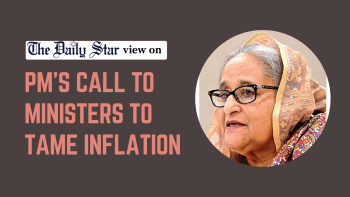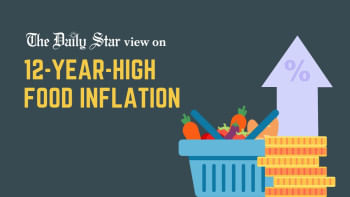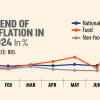Will food prices finally come down?

After a year that saw the prices of essentials constantly climbing up—with food inflation peaking at 12.56 percent in October, the highest in at least a decade—the government's latest decision to go for a coordinated effort to control the market is certainly good news. If successful, the average citizen will finally get respite from these relentless price hikes. However, the big question is whether this move will truly bring relief or it will be akin to many of the efforts that failed to put a dent on this seemingly perennial problem.
The new government seems to be taking this matter seriously, as multiple ministries and government bodies have come together to address this issue. The finance ministry is set to prepare a plan of action for the first 100 days of this government, highly prioritising steps to tackle inflation. Meanwhile, the food and commerce ministries have issued a host of directives to administration officials and businesspeople. These are certainly promising signs of change.
To control the chaos in the market, however, the administration has to take measures that address the structural issues. As we have seen before, random raids to catch hoarders do little to bring the prices down, unless there is strict implementation and follow-through by the authorities. Over the past few years, we have seen the unchallenged dominance of a few syndicates who are manipulating the supply chain and hiking up prices. The government, curiously enough, has thus far refused to identify these nameless, faceless syndicates and bring them to book. The good news is that the state minister of commerce has assured us that the mention of syndicates—which were responsible for doubling the price for onions overnight last year—may not be heard from July onwards. We desperately hope for that reality, but again, such ambitious goals cannot be realised without comprehensive measures and political goodwill.
Another pertinent issue is that of imports. During a meeting, sugar and edible oil importers said US dollars have to be made available in the market so they can easily open letters of credit (LCs) ahead of Ramadan. The holy month is a time when we see prices of essentials soar, so it is imperative that the government resolve such matters to ensure proper supply. On a broader level, we must take long-term measures to address our dependence on and mismanagement of imports. According to the Food and Agriculture Organization, Bangladesh is the third-largest food importer in the world. Because of the dependence and mismanagement of imports, the authorities often fail to play a timely role in dealing with food crises within the country when other countries enact export bans.
Ultimately, on-paper measures, like the price fixing of essentials last year, and ineffective initiatives such as raids will bear little fruit. The administration has to make large businesses accountable, eliminate syndicates, and manage imports with accurate data to pull us out of this crisis. We hope the new government will prepare actionable plans to these ends.


 For all latest news, follow The Daily Star's Google News channel.
For all latest news, follow The Daily Star's Google News channel. 










Comments